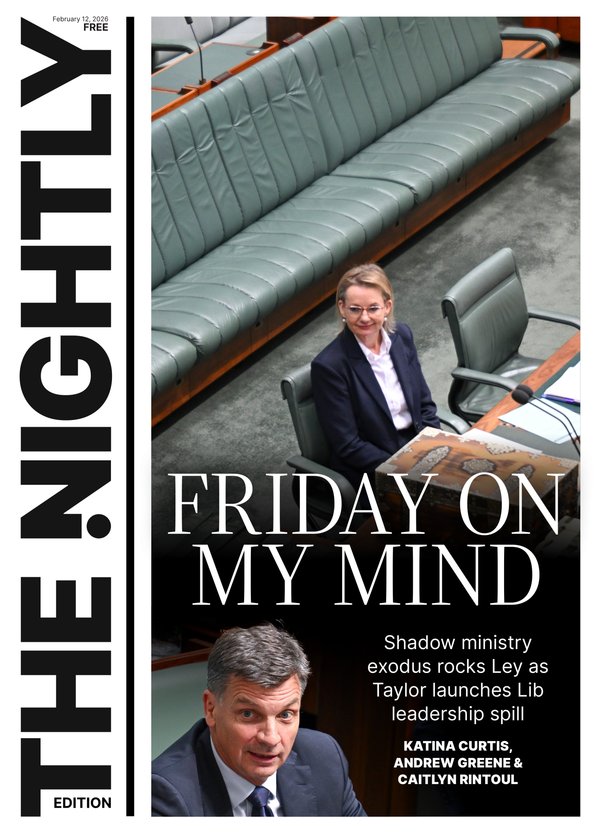Nick Bruining: The 10 questions kids should ask Mum and Dad to help manage their estate when they’re gone
It’s the talk many families try to put off as long as possible but discussing one’s death with loved ones or those you trust can provide peace of mind, not least for those left behind. Here’s what to ask.

It’s the talk many families try to put off as long as possible, scared some supernatural influence will bring to fruition the adage “don’t tempt fate”.
But the reality is, discussing your death in an open and frank manner with your loved ones or those you trust can provide peace of mind for everyone — none more so than those left behind.
Every financial planner has a tale of a client who died, leaving a “dog’s breakfast”. In some cases, simply identifying what’s what can take months.
Sign up to The Nightly's newsletters.
Get the first look at the digital newspaper, curated daily stories and breaking headlines delivered to your inbox.
By continuing you agree to our Terms and Privacy Policy.Unknown assets, undisclosed debts, and even treasures stuck in wall cavities are common complaints. And in this age of the digital universe, critical information can be locked away in cyberspace, inaccessible because no one can guess the password.
Your Money spoke to two highly experienced independent financial planners to build a top 10 list of the questions kids or others likely to administer an estate should ask.
David Jarrott and Annette Sinclair both led their lists by asking if at least three of the four critical documents needed to deal with someone’s affairs — both financially and personally — have been completed.
Financially, everyone should complete a valid will and an enduring power of attorney. While simple DIY will kits are easy to obtain, in this day and age it’s very unusual to have an uncomplicated estate.
“Multiple relationships through life, investment structures like superannuation and family trusts mean that in many cases, getting estate planning advice is a must,” Ms Sinclair said.
“Your local lawyer can assist with basic arrangements or you might consider a specialist estate planning lawyer. That might not be cheap, but neither is a good insurance policy.“
An enduring power of guardianship and advanced health directive are both lifestyle-type documents. These legal instruments provide instructions on how you want to be looked after and who can make those decisions if you’re unable to.
Blank EPAs, EPGs and AHDs can all be downloaded for free.
Ms Sinclair said if you have already planned your funeral or have special requests to include, let people who will be arranging the send-off know the details.
Mr Jarrott said the biggest issue faced by surviving family members was not having the basic information gathered together in one central place.
“Ask if there’s an exercise book or some other accessible document or file that contains all of the information, including bank BSB and account numbers, investment accounts, share-trading accounts, and details about any other assets someone owns,” he said.
Ms Sinclair said other critical documents may include title deeds, certificates, registrations, passports and birth certificates. It was vital to know where they were stored, she said.
“And make sure it’s clearly marked. I’ve known of envelopes stuffed full of important documents being thrown out when rooms in a house were being cleaned up for sale,” she said.
“Next, perhaps in your exercise book with asset details, list all of your logins and passwords. Don’t forget pin numbers for phones and other things.”
It is advised to keep the exercise book hidden away carefully, somewhere a trusted family member can find it if needed.
Mr Jarrott said while family members could not legally act as though they were someone else if the person had died, other logins might give access to critical and important information, “even if it’s something simple like your family tree”.
Both planners suggest a list identifying the professionals you use and their contact details. That might include doctors, financial planners, accountants and lawyers.
“If you have the time, start the ‘chuck-out-the-junk’ process now and set aside those family heirlooms and other things you want them to keep,” Ms Sinclair said.
“It’s probably the No.1 grizzle of all kids dealing with a parent’s estate — sorting through everything.
“Separating the trash from the treasure might prove to be the greatest gift you can unknowingly give them — an estate that’s simple to administer.”
Lastly, if you have superannuation funds — either in accumulation or pension phase — make sure you have completed a non-lapsing binding death nomination.
“If there are no financial dependants left — typically a spouse — consider changing the beneficiary of your super to your estate,” Mr Jarrott said.
“Typically indicated on the super fund form as your ‘legal personal representative’, it will mean that your will distributes the superannuation funds, not the super fund.”
This can often mean that the beneficiaries will not lose valuable tax and other government concessions, which can happen if they receive a super fund death benefit payment direct from the fund.
The top 10 questions your kids should ask:
- Have you prepared a valid will?
- Have you prepared an enduring power of attorney?
- Have you prepared an enduring power of guardianship and considered an advanced health directive?
- Have you completed a valid and current non-lapsing binding death nomination for each superannuation or pension fund?
- Do you have a record of all assets and debts, and have all you valuables in a single place, along with specific account details?
- Do you have a record of all logins, passwords and pin numbers for all online accounts and devices?
- Have you told someone where the information is and how to access it — such as a safe combination?
- Have you made pre-paid funeral arrangements or have any special requests?
- Can you identify, and perhaps introduce, the professionals you use to assist you?
- Have you de-cluttered your home and separated the trash from the treasure?
Nick Bruining is an independent financial adviser and a member of the Certified Independent Financial Advisers Association

